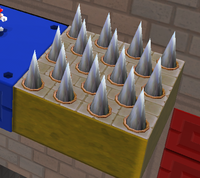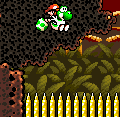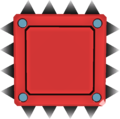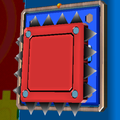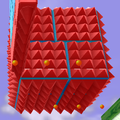Spike Trap: Difference between revisions
m (→References) |
m (Adding categories) Tag: Mobile edit |
||
| Line 200: | Line 200: | ||
}} | }} | ||
[[Category:Hazardous objects]] | [[Category:Hazardous objects]] | ||
[[Category:Koopa Troop weapons]] | |||
[[Category:DK: King of Swing]] | [[Category:DK: King of Swing]] | ||
[[Category:DK: Jungle Climber]] | [[Category:DK: Jungle Climber]] | ||
Revision as of 01:49, September 29, 2023
- This article is about the common obstacle. For other uses of the word "spike", see Spike (disambiguation).
| Spike Trap | |||
|---|---|---|---|
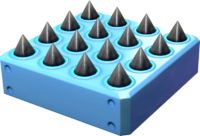 Render of a Spike Trap from Super Mario Odyssey | |||
| First appearance | Yume Kōjō: Doki Doki Panic (1987, overall) Super Mario Bros. 2 (1988, Super Mario franchise) | ||
| Latest appearance | The Super Mario Bros. Movie (2023) | ||
| |||
| |||
Template:Quote2 Spike Traps (or spikes, sometimes Spiked Blocks,[1] spiked platforms,[2] spike platforms,[3] or Spiked Floors[4]) are harmful obstacles that appear in nearly all games of the Super Mario franchise. Spike Traps can be stationary, retractable, or attached to a moving object. They are introduced in Super Mario Bros. 2. They function similarly to the Icicles from Mario Bros.; however, Spike Traps fall differently.
History
Super Mario series
Spike Traps are very common obstacles throughout the Super Mario series. When touched, they cause the player to lose their current power-up and if the player is Small Mario, they will lose a life. Players can safely traverse across spikes when invincible without any consequences.
Super Mario Bros. 2
In Super Mario Bros. 2, in a few levels, the player has to ride an Autobomb in order to cross some Spike Traps.
Super Mario Bros. 3
In Super Mario Bros. 3, if Mario or Luigi wears a Goomba's Shoe, he can easily hop across spikes but can still be hurt from touching them with his side or head. In this game, spikes can also point left, right or downwards. In Super Mario Advance 4: Super Mario Bros. 3, the World-e level Castle Dash contains circular Spike Traps that resemble large Spiny Eggs that simply float in place. These also appear in the Orange Mushroom House mini-game alongside moving blue ones.
Super Mario World
In Super Mario World, Yoshi can safely walk on Spike Traps due to the boots he wears. This game also introduces the falling spike.
Super Mario Bros. Deluxe
In Super Mario Bros. Deluxe, Spike Traps appear during certain levels of the You vs. Boo mode. They can be changed to solid blocks with the use of the Face Blocks.
Super Mario Sunshine
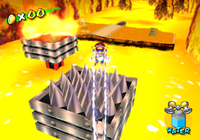
In Super Mario Sunshine, they only appear in Corona Mountain. Coming into contact with them will mostly cause Mario to lose a life due to the spikes ignoring Mario's invincibility frames.
Super Mario Galaxy / Super Mario Galaxy 2
In Super Mario Galaxy and Super Mario Galaxy 2, Mario or Luigi bounces into the air, loses health, and runs uncontrollably after coming into contact with a Spike Trap, similarly to lava.
New Super Mario Bros. Wii
Spike Traps appear in New Super Mario Bros. Wii in two forms: traps with each spike being one block wide like in Super Mario World, as seen in World 5-![]() Tower, and traps with each spike being half a block wide like in Super Mario Bros. 3, as seen in World 3-
Tower, and traps with each spike being half a block wide like in Super Mario Bros. 3, as seen in World 3-![]() Castle.
Castle.
Super Mario 3D Land
In Super Mario 3D Land, Spike Bars make their first appearance. They operate similarly to Fire Bars. Retractable spikes on the floor make their appearance as well.
Super Mario 3D World
In Super Mario 3D World, the ground spike traps appear again in levels such as Hands-On Hall and Spiky Spike Bridge.
Super Mario Maker / Super Mario Maker for Nintendo 3DS
In Super Mario Maker and its 3DS port, Spike Traps are classified as block objects. Depending on the game style and theme, Spike Traps can change appearance, most notably in the Super Mario Bros. 3 and Super Mario World game styles, where in the underwater theme, the Spike Trap is replaced by a Jelectro or a Sea Urchin from The Legend of Zelda: Link's Awakening (which in turn is based on the Gordo from the Kirby series, and in this appearance acts more like one due to being invincible), respectively. Additionally, shaking a Spike Trap in the New Super Mario Bros. U ground theme makes a train sound.[5]
Super Mario Run
Spike Traps reappear in Super Mario Run, making their first appearance in the level Shell Me the Way! when collecting the Black Coins. They have the same appearance as the Spike Traps in the New Super Mario Bros. U style of Super Mario Maker.
Super Mario Odyssey
In Super Mario Odyssey, the Spike Traps appear once again in their Super Mario 3D World design, where they can be found in Bowser's Kingdom. In one part, Mario must capture Jizo statues to safely move over them.
Super Mario Maker 2
Spike Traps reappear in Super Mario Maker 2, functioning as they did in the previous Super Mario Maker games. The Super Mario 3D World style replaces them with Spike Blocks.
Yoshi franchise
Yoshi's Story features living, jumping Spikes in Bone Dragon Pit and Magma Castle.
Unlike other games, spikes are fatal, as simply touching them causes a Yoshi to lose a life. A more common sharp object, a thorn, also appears in the Yoshi's Island series. In the same series, falling into lava or spikes are the only ways Yoshi's death is shown on-screen (not counting when the baby is snatched away); the former shows him spinning and collapsing, while the latter shows him flying off-screen.
Mario vs. Donkey Kong series
Spikes are common indestructible obstacles throughout the Mario vs. Donkey Kong series. Like the other obstacles in the series, they can instantly take out the playable characters. However, enemies are able to stand or walk safely on spikes. In these games, spikes bob up and down slightly, although this is just aesthetic.
Mario vs. Donkey Kong
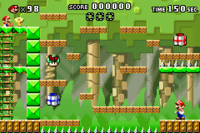
Spikes have a generic appearance in Mario vs. Donkey Kong. They cover pits and platforms, always pointing upward. In some levels, Mario can stand on enemies such as Shy Guys and RamRams and ride them across a bed of spikes to traverse it.
Mario vs. Donkey Kong 2: March of the Minis / Mario vs. Donkey Kong: Minis March Again!
Starting with Mario vs. Donkey Kong 2: March of the Minis, spikes have a red metallic base framing them. In this game and Mario vs. Donkey Kong: Minis March Again!, the sides of these spikes are harmless, but the Minis will attempt to jump over the spikes once they encounter a side and break themselves anyway.
Mario vs. Donkey Kong: Mini-Land Mayhem!
In Mario vs. Donkey Kong: Mini-Land Mayhem!, and in future 2D Mario vs. Donkey Kong games, spikes can also be seen covering walls and ceilings.
Mario and Donkey Kong: Minis on the Move
In Mario and Donkey Kong: Minis on the Move, some tiles consist of spike pits. When a Mini reaches the edge of one, it will tip there for a short time. If the player does not modify the Mini's path in time, the toy will fall onto the spikes and cause a Game Over.
Mario vs. Donkey Kong: Tipping Stars
In Mario vs. Donkey Kong: Tipping Stars, each row of spikes has two additional smaller spikes on its sides, destroying a Mini instantly upon coming into contact with them. The middle spikes also appear shorter now than in previous appearances.
Mini Mario & Friends: amiibo Challenge
Spikes retain the appearance from the previous title in Mini Mario & Friends: amiibo Challenge. Mini Bowser Jr.'s Spike Guard ability allows the toy to hover above spikes and cross them safely.
Paper Mario series
 This section is a stub. You can help the Super Mario Wiki by expanding it.
This section is a stub. You can help the Super Mario Wiki by expanding it.
Paper Mario: The Thousand-Year Door
A Spike Trap appears in Paper Mario: The Thousand-Year Door in Hooktail Castle. When Mario takes the Black Key out of the chest, spikes pop out of the ground to form a maze and the ceiling starts to lower down with spikes. Mario must run out of the spike maze in 50 seconds or he will receive a Game Over.
Spikes also serve as obstacles in some platforming sections, and falling into them will cause Mario to lose 1 HP, go flying off the top of the screen, and land at the start of the section.
Paper Mario: Color Splash
Spike Traps appear in Paper Mario: Color Splash. Spike pits appear in levels such as Mustard Café, The Golden Coliseum, and Fortune Island. 8-bit spikes appear in Green Energy Plant. In Kiwano Temple, there are many spikes that resemble Spiny Shells. Some must be crossed by rolling platforms, and others must be flipped over with a POW Block.
Super Princess Peach
Two types of spikes appear in Super Princess Peach. The first type are round, block-sized objects often found in midair or on ceilings. They are usually found on top of areas with blue Donut Blocks to prevent the player from jumping, requiring the use of the Gloom vibe to cross those blocks. They also have a rotation animation, but are otherwise stationary. The other type of spike is a floored variety that also comes in a large size. These ones are thematically decorated to fit each world of the game. When Princess Peach runs into one, she takes half a heart of damage; while invincible, she can move through the airborne type.
Nintendo Land
Spikes are hazards in the Yoshi's Fruit Cart minigame in Nintendo Land. If the Yoshi Cart touches a spike, the player loses a life. Spikes can be retracted by using a lever. When retracted, the Yoshi Cart can safely walk on them. They first appear in Gate 23.
Prize description
Luigi's Mansion 3
Spike Traps appear in Luigi's Mansion 3, primarily in Castle MacFrights. They will harm Luigi; however, Gooigi can walk through them without getting hurt.
The Super Mario Bros. Movie
Many Spike Traps are seen in The Super Mario Bros. Movie scattered around the Training Course and attached to Brick Blocks and Empty Blocks.
Gallery
Screenshot of Ladida Plains 1-3 in Super Princess Peach
Multi-surface spikes that only appear in the Flipsville Galaxy in Super Mario Galaxy 2
Spikes in Donkey Kong Country: Tropical Freeze
Spike Trap sprite in the Super Mario Bros. style in Super Mario Maker
Spike Trap sprite in the Super Mario Bros. 3 style in Super Mario Maker
Spike Trap sprite in the Super Mario World style in Super Mario Maker
The Sea Urchin in Super Mario Maker
Spike Trap sprite in the New Super Mario Bros. U style in Super Mario Maker
Some spike traps in Bowser's Kingdom in Super Mario Odyssey
Names in other languages
| Language | Name | Meaning | Notes |
|---|---|---|---|
| Japanese | トゲ[6] Toge トゲ玉[7] Togedama トゲブロック[8] Toge Burokku トゲ床[9] Toge Yuka 針[10] Hari 針の床[10] Hari no Yuka トゲ地形 (Super Mario Maker 2) Toge Chikei |
Spike Spike Ball Spike Block Spike Floor Needle Needled Floor Spike Terrain |
|
| Chinese | 尖刺地形[?] Jiāncì Dìxíng |
Sharp point terrain | |
| Dutch | Stekels[?] | Prickles | |
| German | Stacheln[?] | Spikes | |
| Italian | Spuntoni[?] | Spikes | |
| Korean | 가시지형[?] Gasi Jihyeong |
Spike Terrain | |
| Portuguese | Armadilha Espinhosa[?] | Spiked Trap | |
| Russian | Колючка-западня[?] Kolyuchka-zapadnya |
Trap Spike | |
| Spanish | Trampa Espinosa Bola de picos[?] |
Spiky Trap |
References
- ^ Super Mario Bros. Deluxe instruction booklet, page 19.
- ^ Hodgson, David S J, Bryan Stratton, and Stephen Stratton. Super Mario Sunshine Prima's Official Strategy Guide. Pages 15, 170 and 171.
- ^ Hodgson, David S J, Bryan Stratton, and Stephen Stratton. Super Mario Sunshine Prima's Official Strategy Guide. Page 171.
- ^ von Esmarch, Nick, and Cory van Grier. Donkey Kong Country: Tropical Freeze PRIMA Official Game Guide. Page 26.
- ^ GameXplain. April 4, 2016. Train Whistle SECRET in Super Mario Maker. YouTube. Retrieved May 18, 2016.
- ^ Shogakukan. 2015. Super Mario Bros. Hyakka: Nintendo Kōshiki Guidebook, pages 41, 61, 78, 105, 119, 150, 200.
- ^ Shogakukan. 2015. Super Mario Bros. Hyakka: Nintendo Kōshiki Guidebook, Super Mario Land 2: 6 Golden Coins section, page 78.
- ^ Mario & Wario instruction booklet, page 9.
- ^ Shogakukan. 2015. Super Mario Bros. Hyakka: Nintendo Kōshiki Guidebook, pages 170, 186, 233.
- ^ a b Mario vs. Donkey Kong Shogakukan book
- Hazardous objects
- Koopa Troop weapons
- DK: King of Swing
- DK: Jungle Climber
- Mario & Wario
- Mario and Donkey Kong: Minis on the Move
- Mario vs. Donkey Kong objects
- Mario vs. Donkey Kong: Mini-Land Mayhem!
- Mario vs. Donkey Kong: Minis March Again!
- Mario vs. Donkey Kong: Tipping Stars
- Mario vs. Donkey Kong 2: March of the Minis
- Mini Mario & Friends: amiibo Challenge objects
- New Super Mario Bros. objects
- New Super Mario Bros. 2 objects
- New Super Mario Bros. U objects
- New Super Mario Bros. Wii objects
- Nintendo Land objects
- Paper Mario: Sticker Star objects
- Paper Mario: Color Splash objects
- Super Mario Advance objects
- Super Mario Advance 4: Super Mario Bros. 3 objects
- Super Mario Bros. 2 objects
- Super Mario Bros. 3 objects
- Super Mario Bros. Wonder objects
- Super Mario Galaxy 2 objects
- Super Mario Maker objects
- Super Mario Maker 2 objects
- Super Mario Sunshine objects
- Super Mario Odyssey objects
- Super Mario World objects
- Super Mario World 2: Yoshi's Island objects
- Super Paper Mario objects
- Super Princess Peach objects
- The Super Mario Bros. Movie objects
- Wario Land: Super Mario Land 3 objects
- Wario Land II objects
- Yoshi Topsy-Turvy objects
- Yoshi's Island DS objects
- Yoshi's Island: Super Mario Advance 3
- Yoshi's New Island objects
- Yoshi's Story objects
- Yoshi's Woolly World objects
